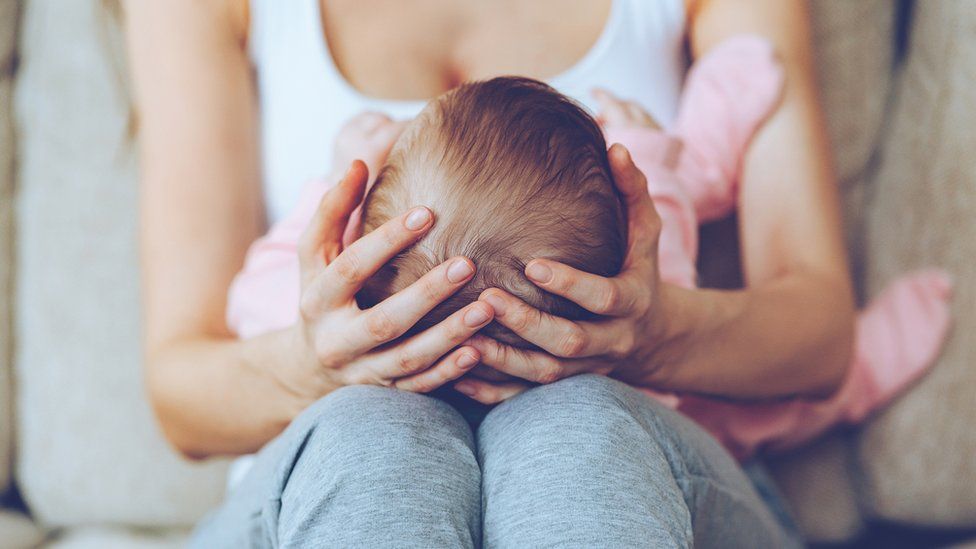Birth trauma: Women urged to 'raise your voices'
- Published

"I had an awful birth experience. But I didn't die. My baby didn't die... So why does that tale even need to be told?"
A blog about the trauma of childbirth is being widely shared on social media - and it is prompting others to share their experiences.
The Every Mum Should Know post has been viewed over 90,000 times.
It's written by Sarah, a mum from Yorkshire, who began blogging to help cope with her feelings after the birth of her daughter, who is now almost two years old.
In the blog, she says: "Birth is not always a positive experience. And being honest about that should not be something that women are made to feel shame or guilt over.
"Expressing natural feelings of sadness or anger about a difficult birth doesn't mean that a new mother is ungrateful for a healthy baby, the opportunity for motherhood, or anything else."
Speaking at the beginning of Birth Trauma Awareness Week, Sarah told BBC News: "It isn't always about life or death - nearly losing a baby or your own life. It's also about the way you are treated during birth.
"I think one of the reasons new mums suffer in silence is that they think they have no right to feel traumatised if they leave hospital with a healthy baby."
'Constant fear'
Her own experience was a birth that began in a birthing pool but developed into an assisted delivery. She says they "nearly lost" her daughter a number of times.
"There was a general feeling of panic in the birthing room. I went from feeling really empowered to feeling completely out of control."
Things didn't improve when Sarah went home. "I knew something wasn't right. I couldn't sleep. I was constantly in fear that my new baby would die if I stopped watching her sleep or listening for her breathing.
"I struggled on quietly, thinking this must just be what being a new mother feels like.
"It wasn't. It was hypervigilance: a common symptom seen with post-traumatic stress, where the body feels like it is constantly in danger and under attack."
Websites offering information and support about birth trauma:
And you can join the discussion on our Facebook page.
It was only when her daughter was six months old, and Sarah felt she was struggling to wean her, that a health visitor spotted that things weren't right. She told Sarah: "Your daughter's fine - but you're not."
Sarah says: "Telling her that was the unravelling of me. I had a total breakdown. It took me months to even have the coping strategies to do the most basic things."
'Happy face' pressure
Sarah is still having counselling - and says she wishes she had known more about birth trauma before her delivery.
"No-one wants to scare 'the pregnant woman'. People assume that if you talk about anything negative, they'll be scared.
"It was my first child. It was hard -but everyone says motherhood it's hard - so I thought it must be me.
"I was asking myself: 'If others are coping really well, why am I not?'"
Women commenting on the blog agree the issue needs to be discussed more.
One says: "We need to break the taboo over talking about birth trauma and challenge the (persistent...) myth 'all that matters is a healthy baby'."
Someone else posted: "I felt so much pressure to put on a 'happy face'"; while another added: "I often suppress the full expression of my birth trauma story to keep others comfortable".
The Birth Trauma Association estimates a third of mothers experience some kind of traumatic response to childbirth.
It says women can be affected by births where they or their baby were in danger - but that it can also happen if they feel out of control, or like they aren't being listened to.
A spokeswoman said: "The first port of call for a woman in this position is to go to their GP. We have lots of leaflets which can be printed off which explain symptoms - not all GPs know about post natal PTSD [post-traumatic stress disorder]."
But she said she wasn't surprised the blog was being widely shared. "We constantly hear from women who have been traumatised by their birth experience. These women need help, but it's not always there."
Sarah says the reaction has been amazing.
"At the start it was just to get things out when I couldn't sleep; it was cathartic. This seemed like the only way I could process things.
"I felt silenced, like there wasn't anyone I could really share with. But people connecting with it makes me feel less alone.
"It made me feel I had my voice back. And I want it to encourage other women to raise their own voices again."